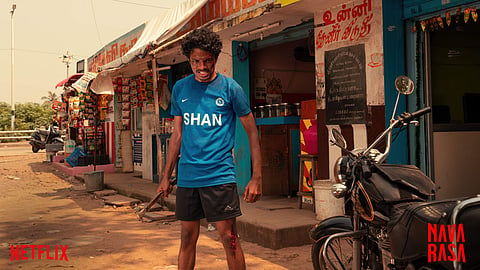Navarasa Review: Roudhram - Arvind Swami makes a promising directorial debut
Rating:(3.5 / 5)
If Bejoy’s Edhiri (Karunai) contained an important moment of roudhram, Arvind Swami’s Roudhram contains an important moment of Bibhatsa (disgust). It’s a film that explores anger, of two main types: red-hot rage, and the more affecting variety, the simmering, undying variety. We are introduced to a poor neighbourhood, a place where people struggle to pay rent and put food on the table, a place populated by unkind homeowners and opportunistic loan sharks.
Rasa: Roudhram (Anger)
Director: Arvind Swami
Cast: Riythvika, Sree Raam, Geetha Kailasam
Streaming: Netflix
At the centre of this story may seem to be a man—a teenage boy, in fact (played by Sree Ram, who I really liked). But make no mistake, this is a film about many types of women: the little girl who wants to escape the asphyxiation of the neighbourhood, the mother who wants her children to have a life different from her own, the policewoman who finds relief in brutalising suspects… There’s even a sex worker who gets to be part of a lovely scene on a terrace where she and another character, a mother, weigh in on what it’s like to be a woman. At the outset, they seem like they have different takes, but you realise they are communicating the same: being a woman in our society is a burden.
This film also has some great commentary on how rage is, in a sense, a natural consequence of being a have-not. Those who have, can afford the luxury of composure. Those who don’t, suffer, and in their suffering, rage. In a lovely directorial touch, Arvind Swami changes a Mani Ratnam song, ‘Vennila vennila vennilaave’ from Iruvar, from being one about seduction into being one about exploitation. There’s a fantastic twist too in this film, but not the obvious one about an identity reveal. The twist I enjoyed is how Arvind lures you into believing that the film is about one sibling, while actually being about the other. It’s a great touch, and one that really ties in with the film’s consistent interest in its women.
There’s even time in this film to dig into cusswords, like ‘the****** pa***’, for instance—and speak of the shame it creates in a man, of how it humiliates a woman. The observation here is how society plants ideas concerning purity in the minds of our children, and how this, in turn, debilitates and damages them. If I had some grouse at all, it would be that Rahman’s music handholds a bit too much, but that’s just a minor complaint about my second most favourite film of this anthology.

